#Balkh
Explore tagged Tumblr posts
Photo

Rumi
Jalal ad-Din Muhammad Rumi (also given as Jalal ad-did Muhammad Balkhi, best known as Rumi, l. 1207-1273 CE) was a Persian Islamic theologian and scholar but became famous as a mystical poet whose work focuses on the opportunity for a meaningful and elevated life through personal knowledge and love of God.
He was a devout Sunni Muslim and, even though his poetry emphasizes a transcendence above religious strictures and dogma, it is grounded in an Islamic worldview. Rumi's God is welcoming to all, however, no matter their professed faith, and one's desire to know and praise this God is all that is required for living a spiritual life.
He was born in Afghanistan or Tajikstan to well-educated, Persian-speaking parents and followed in his father's profession as a Muslim cleric, establishing himself as a well-respected scholar and theologian until he met the Sufi mystic Shams-i-Tabrizi (l. 1185-1248 CE) in 1244 CE and embraced the mystical aspects of Islam. After Shams disappeared in 1248 CE, Rumi searched for him until he realized that Shams' spirit was with him always, even if the man himself was not present, and began composing verse which he claimed to receive from this mystical union.
Rumi's poetry is characterized by a deep understanding of the human condition which recognizes the grief of loss as well as the ecstatic joy of love. The power of transcendent love, whether for another person or God, is central to his work and conveyed through images, symbols, and stories drawn from the Quran, the hadiths, Persian mythology, legend and lore, as well as specific tableaus of daily life.
He composed his verse by spinning in circles, receiving the images he put into words, and dictating these to a scribe, thereby developing the Sufi practice of the whirling dervish as a means of apprehending the Divine. He is considered one of the greatest Persian poets of the medieval era as well as one of the most influential in world literature and his works continue to be bestsellers in the present day.
Early Life & Name
Rumi was born in the city of Balkh in modern-day Afghanistan. It has been suggested that his birthplace was Vakhsu (also given as Wakhsh) in Tajikstan but Balkh is more probable as it is known that a large Persian-speaking community flourished there in the early 13th century CE and, more significantly, one version of his name signifies his place of origin – Balkhi – “from Balkh”.
Almost nothing is known of his mother, but his father, Bahauddin Walad, was a Muslim theologian and jurist with an interest in Sufism. Sufism is the mystical approach to Islam, which rejects dogmatic strictures in favor of a personal, intimate relationship with God. Sufism is not a sect of Islam, but a transcendent path of personal spiritual revelation based on Islamic understanding. Although many orthodox Muslims of the time (and still today) rejected Sufism as a heresy, the city of Balkh encouraged its development and supported Sufi masters. How deeply Rumi's father immersed himself in Sufism in unknown, but Rumi was instructed in the mystic aspects of Sufism by one of his father's former students, Burhanuddin Mahaqqiq, which lay the foundation for his later acceptance of this spiritual path.
When the Mongols invaded the region c. 1215 CE, Rumi's father gathered his family, as well as his disciples, and fled. On their travels, Rumi is said to have met the Sufi poet Attar of Nishapur (l. 1145-c. 1220 CE) who gave him one of his books which would exert considerable influence on the young man. Rumi's group does not seem to have had a definite destination in mind at first as they are said to have traveled through the regions of modern-day Iran, Iraq, and Arabia before settling in Konya, Anatolia (modern-day Turkey). By this time (c. 1228 CE), Rumi had been married twice and had three sons and a daughter. When his father died, Rumi took over his position as sheikh of the religious school in the community and continued his father's practices of preaching, teaching, observing religious rites and practices, and ministering to the poor.
His name, Rumi, comes from this period as Anatolia was still referred to as the province of the Byzantine Empire (the Eastern Roman Empire, 330-1453 CE) it had been until 1176 CE when most of it was lost to the Muslim Turks. Someone who came from Anatolia, therefore, was referenced as a rumi, meaning a Roman.
Continue reading...
36 notes
·
View notes
Text
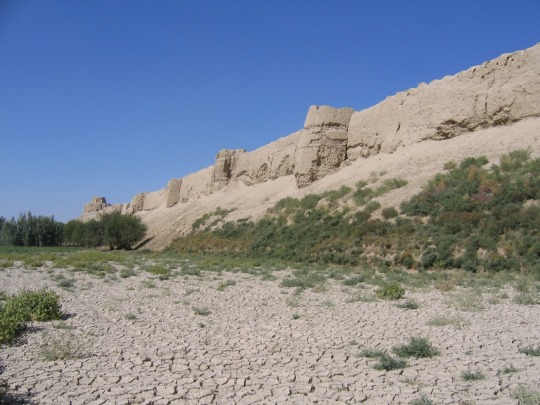
The walls of Balkh, Afghanistan, nicknamed the "mother of cities", a settlement which became incredibly wealthy and sophisticated through her trade with India, China and the Middle East.
#afghanistan#afghanistan history#afghan art#afghan#central asia#silk road#balkh#medieval#middleages#medieval history#medieval art#islamic#islamic history#islamic art#islamic culture
12 notes
·
View notes
Text
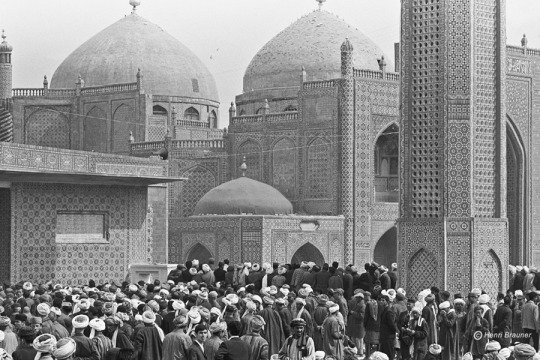
MAZAR-I-SHARIF 1969 / New year celebration
109 notes
·
View notes
Text
Short Story: The Fragrance of the Rain-Soaked Earth
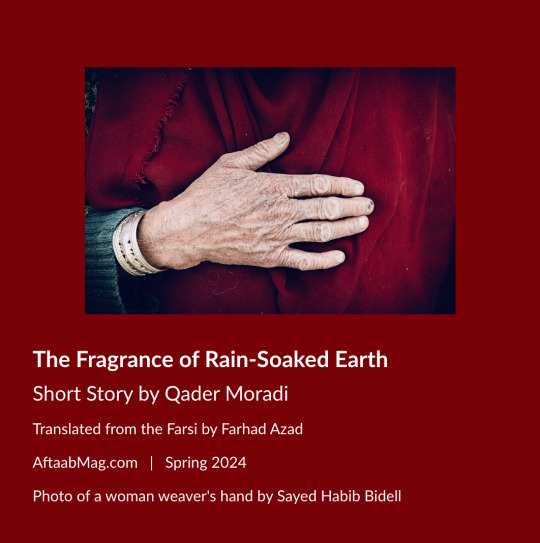
The Fragrance of the Rain-Soaked Earth By Qader Moradi
Translated from the Farsi by Farhad Azad
Renna stood on the flat roof of the house, staring over the worn-out wall's edge. Viewing the green fields and tall trees filled her with joy. Everything seemed fresh and new to her. The scent of the rain-soaked earth stirred an unfamiliar sensation within her.
The moist mud-brick domes of the houses appeared anew to her as if she noticed them for the first time. The spring air carried her emotions and imagination to far-off, magical lands, giving her a strange yearning.
However, the fear and dread that had taken root in the corner of her heart stopped her from finding peace. Despite understanding she had defied Rahman Bai's orders today, she attempted to drive away her fear of him.
She heard a whisper, "Renna, finish the rug. The tourists are waiting."
She knew that if Rahman Bai found out she had not worked on the rug today and scaled onto the roof, another frenzy would follow. As always, Rahman Bai's senseless anger would flare up, and he would mercilessly thrash her. Renna knew this all too well, but she was ready to take any beating this time. She no longer wanted to live fearing Rahman Bai's crazed wrath.
Renna didn't want to be terrified of Rahman Bai anymore. She didn't want to miss such lovely weather and the sight of blossoming trees and lush green fields. Living like this for a moment was worth everything. She imaged Rahman Bai's protruding belly, thick fleshy neck, and bloodshot eyes. She felt that she wasn't afraid of him today.
A smile crept onto her lips. Rahman Bai seemed small and powerless to her. In her heart, she whispered, "Let him do whatever he wants."
She forced the thoughts of Rahman Bai.
After many years, it was as if her feelings and fantasies, like butterflies, had been liberated from captivity. They flew to mysterious lands of emotions, filling her ill and forlorn body with an unrecognizable happiness. Being removed from these beauties saddened her. Her past returned.
Six months had passed since the severe and persistent coughs had been taking her life away. These days, she spewed blood and phlegm. Glancing at herself in the mirror, she astonished herself with her reflection of how fast she had lost her freshness and spirit in her father's house. She was terrified to look at her sunken cheeks and dark-circled eyes. She examined herself more finely and drifted into thought.
A great sadness weighed on her heart. She would hear the same mouthpiece again at such moments, bellowing: "Renna, finish the rug. The tourists are waiting."
She would have to go to the rug-weaving loom, but her illness and persistent coughing prevented her from weaving the rug perfectly.
Plunging into her bed and coughing from the intensity of the pain, she would twist and turn in pain and become weak, calling out to her mother in a high-pitched voice. But no one came to her help. Just as she stared absently into space, without control, tears glided down her thin, gaunt cheeks.
She had a yearning rooted in her heart. She wished to release herself from rug weaving and Rahman Bai's torture. She imagined her as a free bird, but with clipped wings, grounded to weave rugs forever.
Now, she saw herself as a bird flying with wings amidst the lush fields and blooming trees. She flew to wherever her heart desired. She felt happy. She thought she shouldn't taint life's unmistakable and captivating moments with painful memories.
The sun, the pleasant spring air, and the scent of rain-soaked earth aroused a peculiar feeling. For the first time, she felt the charming taste of fleeting, exciting moments of life. She no longer wanted to die young, she was no longer afraid, and she no longer wished to return to the rug-weaving loom. But the past memories returned continuously, breaking her heart.
Her past was dim and stifling, like the room where she wove rugs or the stable where she milked Rahman Bai's dairy cows. She didn't want to think about it. Today, after many years, she felt that she had emerged from a moonless well and saw a glow. She didn't want to spoil these sweet, pleasant beats with bitter memories.
Renna's father would take her rugs to the market and return with pocket money, happily shouting: "Everyone treasured them! The tourists were dazzled, dazzled…"
Two years ago, when she turned fifteen, they fetched her from her father's home to Rahman Bai's. Renna entered a new life among Rahman Bai's old women and young girls collection. Life took on a different shade.
Rahman Bai roared: "You shameless woman! I didn't get you for free. I paid money… money!"
He squawked: "I've already sent three of my wives to the graves, and I'll send you there too…"
With his buddies and in high spirits, he laughed and announced aloud, "Learn from me…pleasure…and money."
He puffed his chest, "At a high cost, I hire a rug-weaving girl. She weaves rugs, and her price is covered after six months, with the rest being my profit."
His friends laughed, and Rahman Bai gloated with pride, affirming: "If one dies, I'll take another rug-weaving girl. Do you understand, a little girl…another fourteen-year-old rug weaver…"
Everyone chuckled. Rahman Bai joined in and blissfully shouted, "Learn from me, from me."
Many times, Renna overheard these exchanges from behind closed doors. Rahman Bai's other three wives and all his elderly and young daughters were aware of these talks, but they pretended ignorance. They were scared of Rahman Bai's wrath.
Fear had become a regular partner in Renna's life. She was afraid of Rahman Bai, his wives, his daughters, and even the servants. She was terrified of everything and everyone. She had no one to confess her sadness to. A world of dread and loneliness trapped her.
But today, Renna felt different for the first time in a long time. She felt a sense of independence and hope. She believed she could escape the clutches of fear and loneliness and lead a different, better life.
The sun shined brightly, the birds sang happily, and the flowers bloomed as gems. For Renna, the entire world smiled at her. She breathed deeply in fresh air, and energy flowed through her veins.
She knew she had to do something, that she had to change her life. Unsure what to do or where to begin, she knew she couldn't stay. She had to break free from the chains that tied her and discover her own way.
She pretended she hadn't heard and behaved as if nothing had been said. But Renna's mind bore to those exchanges, particularly after the illness and coughs that had woven into the lives of all Rahman Bai's women and girls, shaking the branches of their youthful spirit. Like them, Renna's youth was robbed.
Once again, tears welled up in her eyes as she remembered another sore memory. She couldn't overlook her newborn child's death last year because of Rahman Bai's beatings.
She gazed again at the lush green fields—the sun's warmth soothed her illness and exhaustion. The world seemed attractive and stunning. Again, she thought she shouldn't taint life's captivating moments with painful memories. She no longer wanted to die young. She was no longer afraid. She yearned to glide from the rooftop like a bird, flying in the clouds and reaching faraway lands. But she knew she couldn't.
Unconsciously, she looked at her fingers, the bluish dye of her bones visible. The threads of the rugs she wove caused her sore nails to become gnarled and bloody. She saw herself as a clipped-wing, mutilated bird.
She looked at the sky, fascinated by the clear blue color and the white threads of the clouds. She craved to fly, to spread her wings and soar among the clouds. The world seemed beautiful and alluring to her. She saw everything in tints of green, everything in flowering. The fragrance of rain-soaked earth stirred a mysterious longing. She didn't know what she wanted but felt uneasy and restless. Her heart murmured, and a rousing excitement rushed through her veins. Renna wanted to do something, but she didn't know what. Suddenly, a voice surprised her.
Rahman Bai's angry voice growled inside the courtyard, shattering her fragile daydreams. "Where is Renna? Renna…”
A woman answered, "We don't know where she went. We have no idea."
Rahman Bai asked, surprised, "You don't know? Why don't you know? Find her!"
He then shouted a couple more times, "Renna! Renna! Where did you go, Renna!"
Renna knew what was expected of her. She remained still. Ignoring Rahman Bai's shouts, she stared off into the distance. The hollering didn't stir an inch of fear. The warm sun rays brought the lush green fields and flowering trees to life. She didn't want to lose these precious and pleasant moments. She wished to remain in this form until her last breath, with the butterflies of her imagination gliding freely to unknown lands of hopes and feelings overflowing her with this lovely, unspoken desire.
Rahman Bai continued, "Find Renna! She needs to finish the rug. The tourists are waiting for it."
Renna had always hated the word "tourists." She had never seen them but heard that they were rich outsiders. She sensed she was in this miserable condition because of the tourists. In her heart, she cursed the tourists: the hell with them.
Her head spun, and she realized she could no longer stand. Rahman Bai continued to shout and scream. The rhythmic clacking of looms could be heard from inside the houses. Rahman Bai's elderly women and young girls had returned to their looms.
Renna sat down quietly on the rooftop and leaned against the wall. She coughed a couple of times, spitting up phlegm and blood. She covered her eyes, imagining the foliage and flowers. The heat of the sun tickled her ill body. Everything appeared like lush green fields and trees in full bloom. Everywhere smelled of sun-kissed blossoms and the azul sky. Multicolored butterflies fluttered everywhere. She found herself in the white clouds of the sky. The scent of rain-soaked earth stirred a mystifying sensation, drawing her to unknown lands and a delightful feel.
Abruptly, she heard Rahman Bai's raging, furious voice nearby, "You shameless woman, what are you doing here?"
Renna understood the situation. She didn't move, not even open her eyes. She decided to remain in her colorful and lyrical dreams. She thought that opening her eyes would once again drop her from the sky's white clouds into a dim, stifling well.
Rahman Bai's heavy kicks showered down on her head and body a moment later. Rahman Bai's screams reached a crescendo. He bombarded like a madman, screaming and hollering. Like birds with broken wings, the women and girls gathered mutely and mournfully, watching Rahman Bai and Renna on the nearby rooftops.
Renna squirmed under Rahman Bai's kicks. She had decided not to open her eyes to him. Her heart couldn't bear to see his cruel mug and bloodshot, terrified eyes again. She squirmed under Rahman Bai's heavy boots like a bird with broken wings.
The cauldron of Rahman Bai's rage and madness boiled over. Like a ferocious and wild animal, he growled, attacked, kicked, pulled Renna's hair, and flung her about.
But Renna's eyes never opened. She felt closer to the sweet scent of rain-soaked earth, to the lush green fields and the fragrance of blossoms, to the unknown and mysterious lands, and Rahman Bai grew even more angry.
He hollered and said, "The tourists are waiting… the tourists… you had to finish the rug, you shameless woman, the rug… the rug…"
And Renna said to herself, "Curse the rug, curse the tourists," and inhaled the scented rain-soaked earth.
- - -
About the Author
Qader Moradi was born in Balkh Province in 1958 and grew up in Faryab province. He completed high school and studied journalism in Kabul.
He was a teacher and reporter for Bakhtar New Agency. In 1990, his first collection of short stories was published in Kabul.
He was forced to leave Kabul in 1994 because of the Islamist destruction of the city. He currently resides in Holland.
- - -
Summary of this Short Story
In his short story "The Fragrance of the Rain-Soaked Earth," Qader Moradi offers a tragic look at the lives of oppressed women exploited in sweatshop weaving compounds within his native northern provinces of his youth.
He focuses on Renna, a teenager robbed of her adolescence, child, health, and spirit under the ownership of a cruel weaving master. Yet, one morning, veering into the vista of lush tall grasses, trees, and flowers, this spring beauty awakens Renna's soul, stirring dreams of escape.
She longs to soar into the clouds and distant lands, but knowing her circumstances, she understands her wings are clipped – a familiar metaphor in Farsi literature (پرو بالم شکسته). Unable to escape, Renna clings to her dreams, seeking solace in the season's beauty even when struck violently.
Writer Mohammad Hossein Mohammadi summarized Moradi's frequent themes: his characters seek a way out into dreams in the face of unbearable circumstances. "The Fragrance of Rain-Soaked Earth" reflects this theme, with even the simple scent of rain becoming a pathway to defiance against her cruel reality.
—Farhad Azad, April 21, 2024
- - -
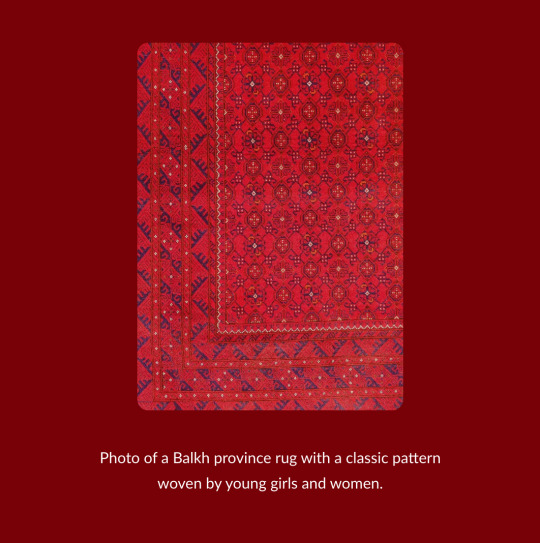
Caption: Photo of a Balkh province rug with a classic pattern woven by young girls and women.
2 notes
·
View notes
Text
巴爾赫 Balkh
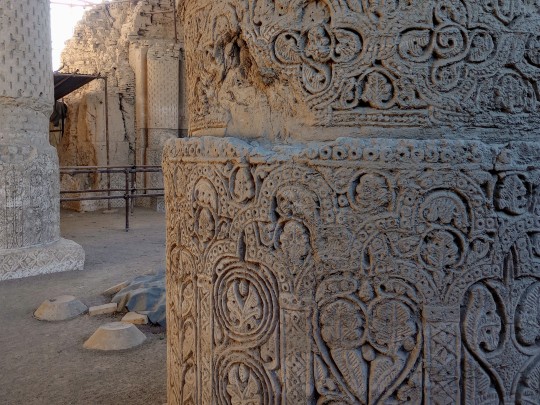
根據考古研究,三四千年以前應該就有伊朗的部落遷入這裡,從不斷發掘出的遺址顯示,這裡存在過各種不同的文明。
Haji Piyada 也稱作九穹頂清真寺 (Mosque of Nine Cupolas),是目前在阿富汗發現的最古老的伊斯蘭建築。
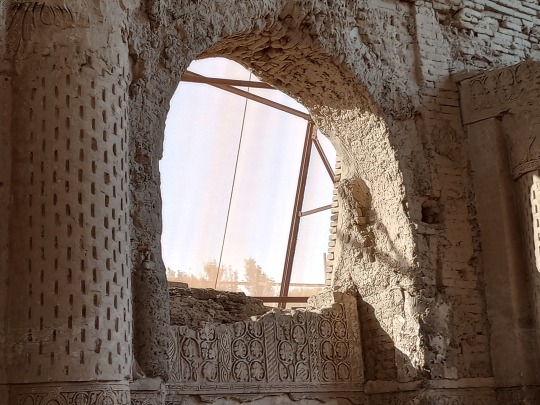


在現代巴爾赫城鎮的北方,有發現一圈土牆遺跡 Ancient Balkh Archeological Site。



巴爾赫這裡也是伊斯蘭教的蘇菲派大師魯米 Rumi 的出生地,據說這個清真寺遺址是他幼年時學習的地方。
這位花剌子模帝國時期的詩人,是神學家也是蘇菲派神秘主義者,他是備受尊崇的穆斯林學者和領袖,父母親都是阿富汗人,但大部分的著作都是波斯語,後來住在土耳其的時間比較多,所以阿富汗、伊朗、土耳其人爭相爭取這位大師的關係。
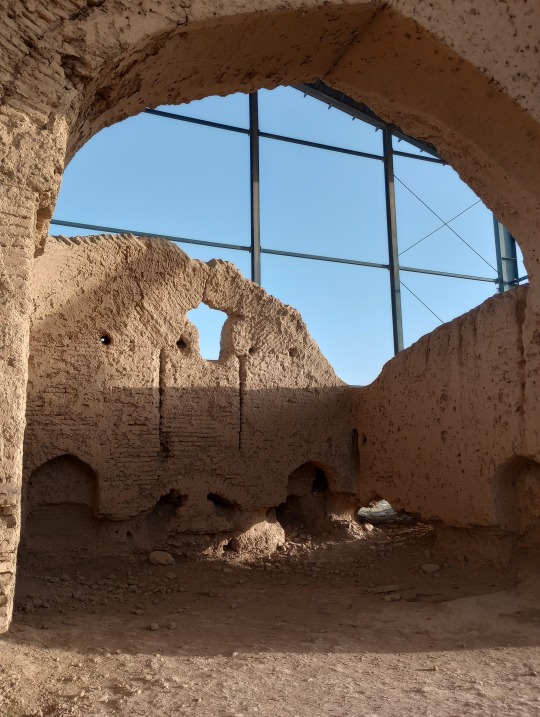

巴爾赫土城牆的遺跡仍可在村莊中看到 Ancient wall of Balkh。
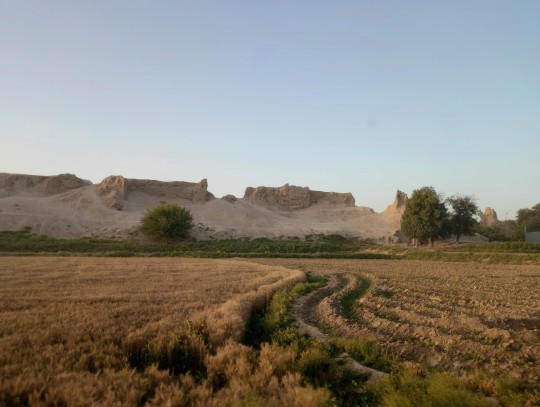

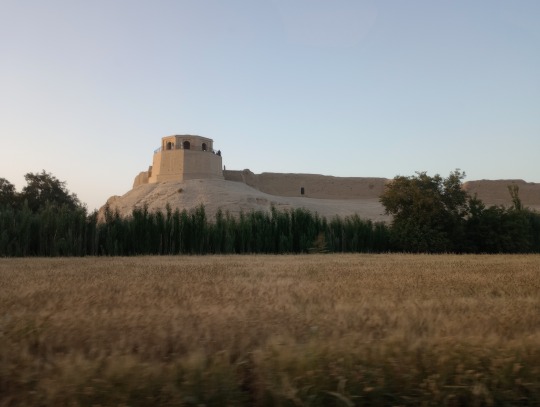
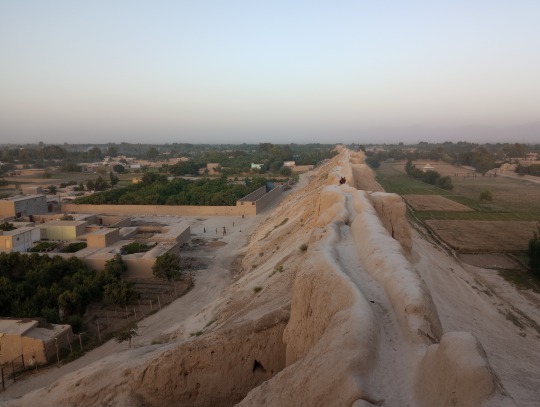
阿富汗這裡仔細探究,其實歷史也很豐富呢!
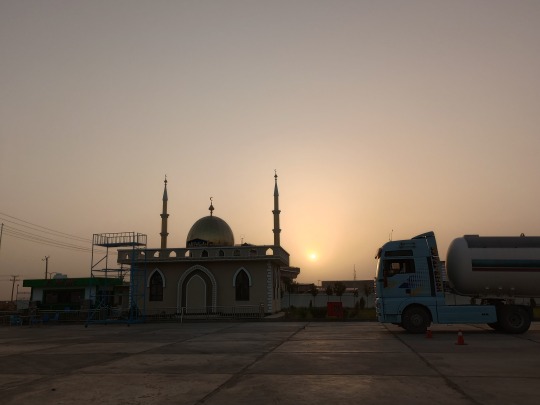
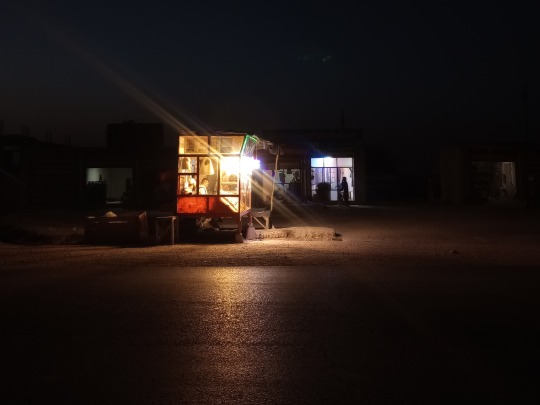
0 notes
Text
The Silk Road Tours Experience: Afghanistan’s Role in World History

The Silk Road was a network of ancient trade routes stretching from Asia through the Middle East to Europe that played a transformative role in world history. This famous pathway had been used to exchange goods, ideas, religions, and cultures and formed the backbone of international trade for centuries. Situated at the heart of this energetic network was Afghanistan, a country rich in strategic location and cultural heritage. The cities of Balkh and Bamiyan formed critical nodes on the Silk Road that shaped economic, cultural, and spiritual transactions in this historical context.
This article discusses the Afghanistan of the Silk Road epoch with special emphasis on significant locations such as Balkh and Bamiyan through which history continues to influence contemporary society and, hence, the world.
Afghanistan: The Crossroads of Civilizations
Afghanistan was at the crossroads of Asia, the Middle East, and Central Asia, making it a natural conduit for trade and cultural exchange. Traders from China, India, Persia, and the Mediterranean passed through its valleys and mountain passes, bringing with them silk, spices, ceramics, and precious stones. In return, they carried Afghan lapis lazuli, horses, and saffron to distant markets.
Beyond goods, the Silk Road was also a route for the exchange of knowledge, technology, and religion. Buddhism, Zoroastrianism, and later Islam flourished in Afghanistan, blending with local traditions and creating a rich tapestry of cultural diversity.
Key Historical Sites Along Afghanistan's Silk Road
1. Balkh: The Mother of Cities
Balkh is known as the "Mother of Cities." This city in northern Afghanistan was an important center of trade and a focal point of religion and culture. It is one of the oldest continuously inhabited cities in the world.
It was a very important city in the ancient Bactrian kingdom and later became an important center for spreading Zoroastrianism and Buddhism. It was also a crossroad for the caravans moving between Central Asia, Persia, and India.
•Cultural Legacy:
It was the habitat of the legendary poet Rumi and witnessed architectural wonders, like the Green Mosque and ancient stupas of Buddhism. Most of what is left of its historical architecture is in ruins, but its heritage as the cradle of civilization lives on.
2. Bamiyan: The Buddhist Heartland
Situated in central Afghanistan, Bamiyan was a vital stop on the Silk Road and an important center of Buddhist learning and art. It flourished as a crossroads between culture and the spirit due to its strategic location.
•The Buddhas of Bamiyan:
Bamiyan housed two giant Buddha statues carved into the cliffs during the 6th century. The tallest in the world, they represented the region's function in the spread of Buddhism in Asia. Although destroyed tragically in 2001, it remains a UNESCO World Heritage Site and a monument to the culture of the region.
• Band-e Amir National Park:
Near Bamiyan lies Band-e Amir, Afghanistan's first national park, featuring a series of stunning blue lakes surrounded by rugged cliffs. It was a natural wonder, attracting travelers and traders; it served as a serene respite on the Silk Road.
3. Herat: The City of Art and Knowledge
Herat is a city in western Afghanistan which was a key city on the Silk Road and flourished in the Timurid Empire as a center of art, architecture, and intellectual thought.
• Architectural Splendor:
Herat's Friday Mosque is one of the finest examples of Islamic art, decorated with beautiful blue tiles. The city's citadel, believed to have been founded by Alexander the Great, is a great testimony to its historical significance.
•Cultural Interaction:
Herat was a cultural melting pot where Persian, Indian, and Central Asian influences merged to create an artistic and intellectual heritage unique to this city.
4. Kandahar: A Gateway City
Kandahar, Afghanistan, was another key trading center along the Silk Road, which connected trade networks from India and the Arabian Peninsula to Central Asia.
•Historical Function:
It was an important passage for the transportation of goods and ideas where traders and travelers entered. This city is also significant because that is where modern Afghanistan was founded by Ahmad Shah Durrani in 1747.
5. The Hindu Kush Mountain Passes
The rugged Hindu Kush mountains presented both a challenge and an entrance for Silk Road travelers. Famous passes, like the Salang Pass and Khyber Pass, connected Afghanistan to the rest of the neighboring areas. It enabled the free flow of goods and people.
•Strategic Importance:
These mountain passes connected Silk Road cities and also served as very important military and trade routes for empires to dominate the area.
Afghanistan Contributions to Global Trade and Culture
Afghanistan's role in the Silk Road was more than just a transit country. It was an active participant in the international exchange of goods, ideas, and cultures:
1. Lapis Lazuli Trade:
Afghanistan Badakhshan mines provided lapis lazuli to ancient civilization such as Egypt and Mesopotamia, which used this stone for their jewelry and art.
2. Spread of Buddhism:
The development and diffusion of Buddhism in the heart of Central Asia and toward China were greatly facilitated through Afghanistan's monasteries and stupas. The art of these Afghan origins influenced the world way beyond Afghanistan's borders regarding the teachings of Buddhism.
3. Cultural Maturity:
The interaction of multifaceted cultures on Silk Road enriched Afghanistan's cultures to create a unique type of art, architecture, as well as their beliefs.
4. Carpet Weaving:
Afghan carpets, with their intricate designs and high craftsmanship, became a hot item in Silk Road markets and remain the hallmark of Afghan culture to this day.
The Legacy of the Silk Road in Modern Afghanistan
Although the ancient Silk Road no longer functions as it once did, its legacy continues to shape Afghanistan. Efforts to revive trade routes, such as China's Belt and Road Initiative, highlight the enduring importance of Afghanistan's location.
Tourism around Silk Road heritage sites also serves as an avenue to celebrate and preserve the rich history of Afghanistan. Challenges abound, but cultural tourism promotional initiatives aim to reconnect Afghanistan to the world.
Visiting the Silk Road Today
This experience of the Silk Road for the traveler in Afghanistan is incomparable. Walking in the footsteps of ancient traders and monks, one gets to understand how in this world, cultures converge, ideas flourish, and sites such as Balkh, Bamiyan, and Herat deepen that connection to history and enable them to witness the resilience and beauty of Afghanistan.
Such a journey would start with the safety and richness of being accompanied by a trusted Afghanistan tour operators like Afghan Logistics & Tours Pvt. Ltd. They have in-depth knowledge of Afghanistan's unique landscapes and cultural treasures that make the Silk Road come alive for modern explorers.
Afghanistan's role in the Silk Road is a testament to its historical significance as a bridge between civilizations. From the bustling bazaars of Balkh to the serene cliffs of Bamiyan, the country's landmarks tell a story of trade, culture, and spirituality that shaped the ancient world.
Today, visiting the Silk Road sites of Afghanistan means not only passing through history but also experiencing a land whose legacy endures in an enduring testament of East to West. Through Afghan Logistics & Tours Pvt. Ltd., travelers can safely experience the wonders of Afghanistan's Silk Road heritage and immerse themselves in timeless beauty.
#AncientCivilizations#SilkRoad#AfghanistanTravel#Balkh#Bamiyan#Herat#AfghanHistory#CulturalHeritage#HistoricalSites#AfghanistanSilkRoad#AncientTradeRoutes#BuddhasOfBamiyan#BandEAmir#AfghanTourism#WorldHistory#HinduKushMountains#TravelAfghanistan#AfghanLogisticsAndTours#SilkRoadCulture#TradeAndCulture#BuddhismSpread#LapisLazuliTrade#AfghanArchitecture#EcoTourismAfghanistan#UNESCOWorldHeritage
0 notes
Text
"Take The Sultan Into Refuge"
Remaining Story Of : “Birth Story of Ibrahim Sultan” Take The Sultan Into Refuge NausherKhan again became king in the next life. There was a city named Balkh inside Iraq. His capital was in that city. The name of the king was Ebrahim Adham Sultan. That soul had performed devotion with devotion in the life of Samman. Because of him, human lives were being given and in return of the donation…
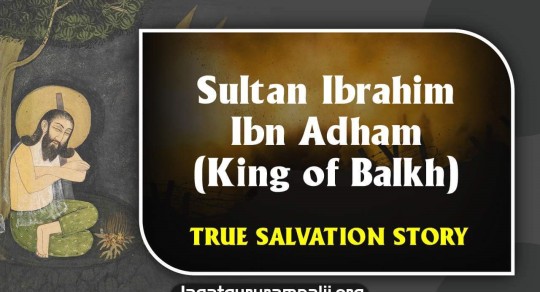
View On WordPress
#author#balkh#book#bookblog#bookgram#bookishlove#booklife#booklovers#bookobsessed#dailyprompt#God#Ibrahim Sultan#Kabir#kabirsaheb#Spirituality
0 notes
Text
Can I tell you that my children are dying of thirst and hunger, under the shadow of a brutal extermination we’re being subjected to?
Today, I went to the border—to the most dangerous side—in search of flour for my family and for others who are starving. I risked my life and came back with nothing.
I can’t afford to buy flour or even bread. A single bag of flour now costs $500, an unimaginable price in a place where we have lost everything.
We have no food. No water. No shelter. No safety. Just hunger, fear, and the cries of our children.
Please, to anyone who hears my voice—if you can help in any way, we are desperate. Even the smallest act of kindness could save a life.


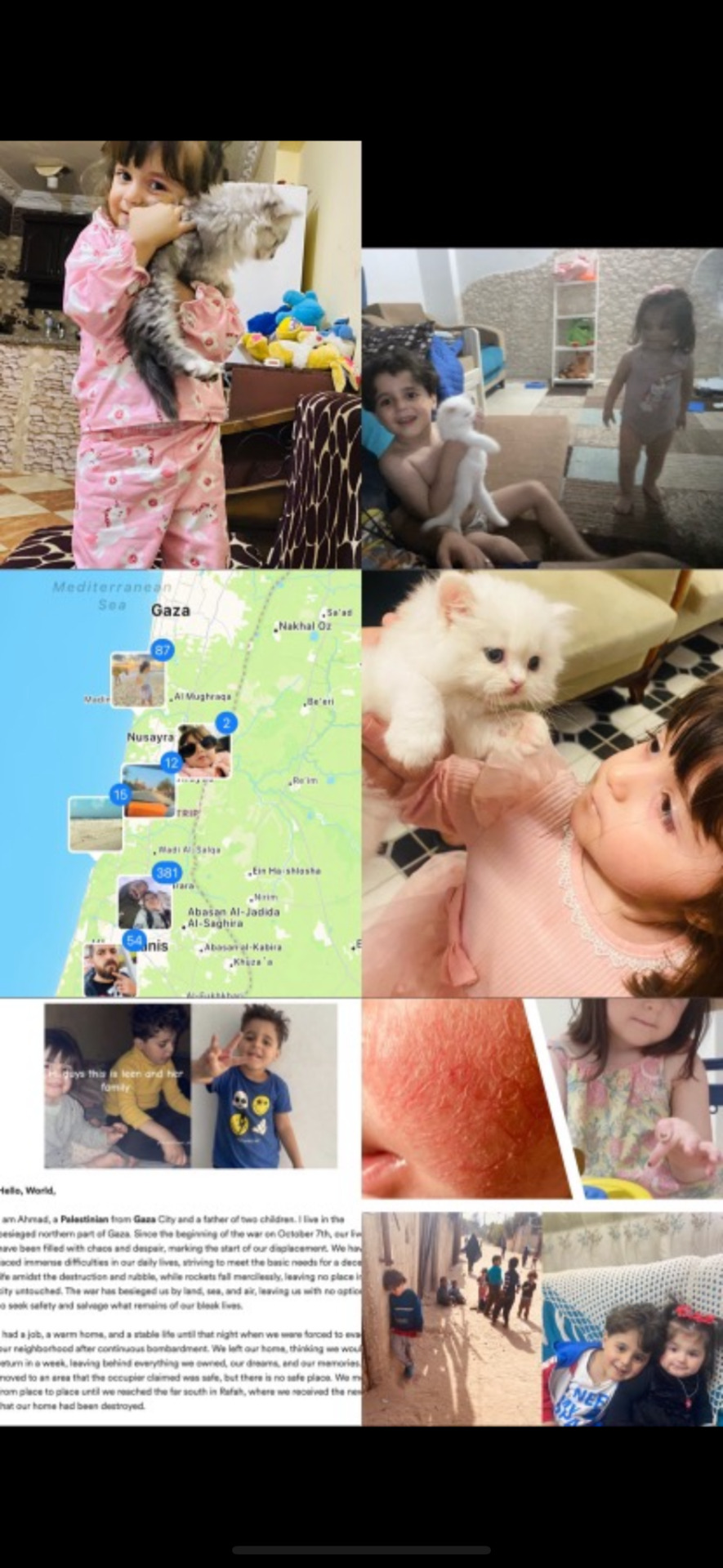
#free gaza#gaza strip#animals#gaza genocide#baby animals#1950s#gazaunderattack#help gaza#60s#gaza#iran#usa#राजा हो तो ऐसाallahkabir ibrahimsultan iran iraq balkh sufism ibrahim islamicstory kabul ramadan hajj quran allah dua santr
45 notes
·
View notes
Text
How exactly did Knock Out and Breakdown meet?
I've been thinking for a long time about how these two freaks met. So I have a few ideas about it.
There are two options: either they met before the war (with several sub-versions), or after the war.
Today, I'll explore one scenario of their meeting before the war
Knock Out was a medical student who was sent for practical training at a construction site. In truth, the project required at least two or three trained medics, but the lives of the construction workers (from the lower castes) didn't concern the officials and aristocrats of the higher castes too much. So they sent Knock Out along with a few other students who were considered expendable
The reason: Knock Out was born in one of the colonies beyond Cybertron, but studied on Cybertron. Because of this, he was treated as an outsider
He wasn't exactly thrilled about the situation, but the internship was mandatory for all students. Had he refused to complete the assignment, it would have seriously affected his grades and risked expulsion from the university
I'm almost certain that Knock Out has mysophobia, or something similar. So working at a construction site, even in the role of a medic, would have been his worst nightmare
Breakdown was one of the construction workers. He was a bricklayer. He also helped demolish old buildings, clean up, and transport construction materials. So he was almost always covered in grime
Breakdown worked together with Bulkhead (I adore that bun — they were best friends before the war)
Knock Out's first day was a disaster. Right off the bat, the construction site supervisor yelled at him, angry that instead of getting experienced medics for a long-term assignment, he'd been sent a mere medical student for just a few months
But they kept him there anyway, because anyone with medical knowledge was better than nothing
That same day, a minor accident occurred — some of the cables used to lift building materials snapped and fell on a few bots who didn't manage to get out of the way in time
Among them was Breakdown. For him, it was love at first sight
For Knock Out, it was a battle with a panic and nausea
Still, he pulled himself together and got to work. Fortunately, there were no serious injuries, so he was able to repair them relatively quickly
The whole time he was doing it, he was chattering — he chatters a lot when he's nervous. Mostly he comments on the injuries, his actions, and everything he sees around him
"this joint isn’t a joint anymore, it’s a modern art piece", "I’ll fix it now… or break it completely. Either way, it’ll look fabulous", "risking my manicure and everything"
Breakdown kept staring at him in silence the whole time. He didn’t even hear what Knock Out was saying. And when it was his turn, Knock Out thought he had a head injury. So he leaned in to take a closer look. The close proximity made Breakdown’s processor overheat, and he promptly passed out
When he came to, the doctor was gone, and he was back in his quarters. He was terribly embarrassed — but he really liked the doctor
He heads straight to the medbay, despite all the warnings from Bulkhead
Meanwhile, Knock Out was scrubbing the entire medbay, making sure not a single speck remained, and he was in no mood for visitors. He simply threw them out, saying not to come unless they needed actual medical help
Breakdown, feeling down, goes out for a drink with his friends. During the outing, he comes up with a brilliant idea — he needs to get injured to see the handsome doctor again. Bulkhead thinks it’s a ridiculous idea and tries to talk him out of it
But it doesn’t work, so he just tries to minimize injuries and constantly brings him to the medbay
All that time, Breakdown never dared speak to Knock Out. Only once did he manage to say something — but it was a terrible attempt at flirting, and the builder nearly died of embarrassment
After that incident, he wasn’t seen at the medbay for a long time
Before the war, there was a caste system on Cybertron. Although I haven't found a detailed description of this system, I'm almost certain it was based on the ancient Indian varna system, with influence from the social structure of ancient Rome. So, in short — you couldn't change your caste, and you couldn't marry or have romantic relationships with someone from a significantly higher or lower caste in the hierarchy
That’s roughly what Bulkhead would always say after each visit to the medbay — though that didn’t stop him from having a ‘friendship with benefits’ with one of the scientists from the local lab (Wheeljack), and sharing with him all of Breakdown’s romantic misadventures
Throughout all this time, Knock Out was completely miserable because of the situation, counting the days until it would all be over. He dreamed of escaping this place as soon as possible and never coming back
The medbay was terribly equipped, the tools were outdated, and there was always a shortage of medications and spare parts — or they were expired. The furniture and equipment were arranged in a horribly inconvenient way, and he couldn’t move them on his own because everything was too massive and heavy for just one person
Although the builders were quite attractive bots but the dirt, noise
During yet another construction accident, Bulkhead was seriously injured and ended up stuck in the medbay for a long time
Breakdown kept visiting him all the time. Sometimes he tried to talk to Knock Out, sometimes he just sat in silence
During one of these visits, Knockout was trying to move a massive wardrobe, but could barely budge it. Breakdown saw this and decided to help. Knockout was surprised, and for a few seconds they stood in awkward silence. Finally, Breakdown dared to speak
— Do you need help? — …Yes, please. — Where to? — To the left, by the window.
These were the first words they ever exchanged. Breakdown beamed with happiness. He moved the cabinet where Knock Out had told him and asked if any more help was needed. Knock Out hesitated, but then asked him to move a few more pieces of furniture
Breakdown didn’t manage to finish everything. He had to leave because his shift at the construction site had started, but he promised to come back and help later
After that, he really did help reorganize the medbay. After a few visits, they even managed to have a conversation
They became comfortable around each other
From time to time, Wheeljack would stop by the medbay. These were very interesting visits. Explosive. They added work and stress for Knock Out
But it contributed to the development of the relationship between Knock Out and Breakdown. They both took a disliking to the scientist
Breakdown started coming to the medbay almost every day — sometimes as a visitor, and sometimes as a patient
Gradually, their affection grew and became mutual. Knock Out decided to teach Breakdown the basics of medicine — at least so he could treat minor injuries
Breakdown told Knock Out about the construction site and brought him a worksite radio so he wouldn’t get bored
After work, Breakdown would invite Knock Out to the local bar to have a drink and chat with other bots. He hadn’t yet dared to ask him on a real date, so he always dragged Bulkhead along, who occasionally brought Wheeljack. Those evenings were the most interesting — and the most traumatic
At the bar, the radio often broadcast speeches about resistance and rebellion against the caste system, the Senate. About injustice and cruelty. Because of this, many arguments arose
Finally, Breakdown dared to ask Knock Out on a real date. He was so nervous that he mixed up his words and, instead of giving the gift, he smashed it
Knock Out agreed
The date took place at the top of an unfinished structure, with a beautiful view of the city and the sky. But it was quiet and enchanting
Aside from the terrible music performance by Bulkhead and Wheeljack, who helped Breakdown prepare everything
But they quickly left and gave the couple some time alone
They had a few more dates
Breakdown introduced Knock Out to the other builders. The older ones didn’t exactly approve of the relationship because of the status difference, while the younger workers supported them — questioning all that caste-system nonsense
Knock Out still hated everything related to dirt, but it was no longer a phobia that sent him into a panic. He had grown used to life on the construction site, to the noisy and messy builders who had accepted him. Although he still scolded them every time they came to him dirty — unless it was an emergency. He was also quite skilled at throwing a circular saw
But the internship period was about to end. Knock Out, who had once dreamed of it, now wished he had more time here
When the day came for him to leave, he promised Breakdown that after finishing his training, he would come to work at their construction site. Until then, they would keep in touch from afar, and he’d visit as soon as he had the chance
But it wasn’t meant to be. Knock Out never finished his training because the war broke out, and he joined the Decepticons, while Breakdown joined the Wreckers. They lost contact, and a lot of time passed before they would meet again
#maccadam#tfp#pre war#knockout#breakdown#tfp kobd#kobd#I love these two#the absolute peak of gay energy#why they had such an unhappy ending#It started out as a romcom#but ended up as a horror film#damn arachnid#The terrible doctor and his clumsy husband#Balkhed was the third wheel#arfter the war they found the ruins of that bar with Knockout and drank to the old days
28 notes
·
View notes
Text
2 notes
·
View notes
Text

2 notes
·
View notes
Text

0 notes
Text

🏀⛹🏿♂️⛹🏿
#iran#iranian#free iran#राजा हो तो ऐसाallahkabir ibrahimsultan iran iraq balkh sufism ibrahim islamicstory kabul ramadan hajj quran allah dua santr#israel iran war#iran news#israel iran conflict#israel#spotify#love#faith#news#art#nba#nfl#music#war#peace#wnba basketball#wnba#fashion#makeup#summer#sun dress#shades#nail art#cute nails#long nails#pink nails#nail polish
1 note
·
View note
Text

0 notes
Text
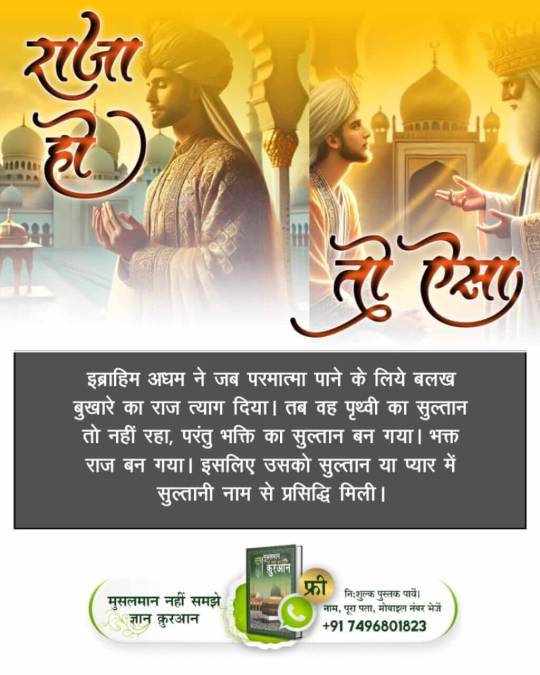
0 notes
Text
0 notes